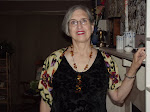Dateline: Texas A&M University, last weekend, Fay Lectures in Jungian Psychology. Michael and I attended together and heard four scintillating - but sometimes baffling - lectures by Joe Cambray on synchronicity. Cambray's lectures will be a book by next year and I probably need to read it to understand a lot of his points, but I got the gist of it. My No. 1 favorite new knowledge from the weekend? This Indian myth, written 2,500 or so years ago, apparently is an explanation of modern field theory physics. (See aside.) That is astonishing in itself, but I fell in love with the illustrations. If you search Indra's Net or Indra's Pearls, you will find a lot of fabulous renderings.
Aside: Indra's Pearls reside on a great net that spans the heavens. At each juncture of the net, there lies a pearl. Each of these pearls reflects all the other pearls into infinity. Through this reflection, each pearl is connected to every other pearl, thus a change to one reflects in all. FYI, Indra is a male god also known as the King of the Gods.
This weekend, Michael and I saw a play - Under the Lintel - at the Alley Theatre in the small theater downstairs. We have season tickets and have sat in the same place for several years. Right in the front row immediately next to one of the actors entrances. I sit on the corner and have had everything under the sun walk, run, or be carted by in close proximity, including a fellow trussed upside and bleeding from a torture session. This time nothing came in that way, but the actor exited there.
John Tyson did a great job of portraying a meek librarian turned into a quester of epic proportions as he sought the mythical Wandering Jew. Very well done, a globe trotting mystery played out in one room with one actor. Bravo.
I began a drawing course two weeks ago and am now entertaining myself immensely by making fairly accurate renderings of spheres, cubes, cones, and pyramids. Also, eggs. I'm quite good at drawing eggs with their shadows. Today I am going to tackle a crumpled piece of paper which I understand is much harder. I always wanted to be able to toss off a drawing that looked good, but I have learned in two lessons that planning is important in drawing and I will probably not be "tossing" anything soon!
I have cat trouble. My two cats are getting on - both 14 years-old this spring. Trixie is a small tortoise shell who is extremely timid. I adopted her out of a paper bag that the SPCA had put in her crate for her to hide in. I hate to think of what her early kittenhood was like. After 14 years of extreme patience and coaxing on my part, she has actually laid on my lap three times in the last year. She also started pooping right outside her litter box in the last year. That does not make me happy.
Jack is our big cat. Recently he's lost some weight and is down to 18 pounds. Jack, unfortunately, is the lap cat! When he sits on your lap, you are pinned down, so you better have the phone and anything else you need in handy reach. Jack is unhappy about something and he is letting us know by peeing places that are inappropriate, like my new sofa. Thank goodness I had it scotch-guarded just after it was delivered. Oh, and both of them throw up, Trixie on the carpet in my bedroom even though the whole rest of her domain is tiled!
So, if you have any advice on how to cure these problems. We have exhausted our resources and have no more ideas. I'm ready to chuck them both - which creates astounding guilt in me - but Michael really, really doesn't want me to do that. Ain't we got fun?
Ciao.





